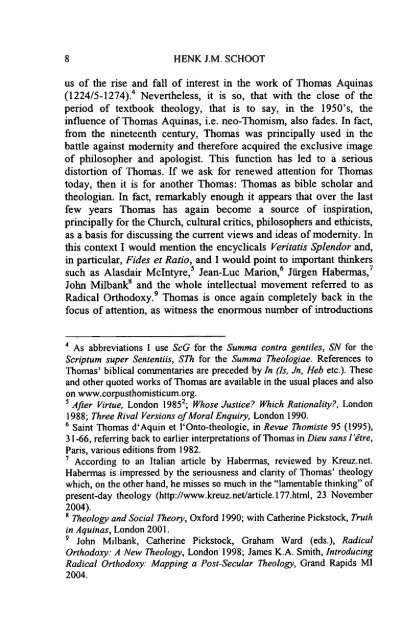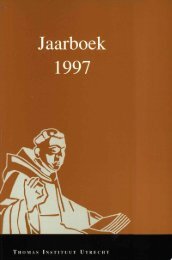Jaarboek Thomas Instituut 2006 - Thomas Instituut te Utrecht
Jaarboek Thomas Instituut 2006 - Thomas Instituut te Utrecht
Jaarboek Thomas Instituut 2006 - Thomas Instituut te Utrecht
Create successful ePaper yourself
Turn your PDF publications into a flip-book with our unique Google optimized e-Paper software.
8 HENK J.M. SCHOOT<br />
us of the rise and fall of in<strong>te</strong>rest in the work of <strong>Thomas</strong> Aquinas<br />
(1224/5-1274).4 Nevertheless, it is so, that with the close of the<br />
period of <strong>te</strong>xtbook theology, that is to say, in the 1950's, the<br />
influence of <strong>Thomas</strong> Aquinas, i.e. neo- Thomism, also fades. In fact,<br />
from the nine<strong>te</strong>enth century, <strong>Thomas</strong> was principally used in the<br />
battle against modernity and therefore acquired the exclusive image<br />
of philosopher and apologist. This function has led to a serious<br />
distortion of <strong>Thomas</strong>. If we ask for renewed at<strong>te</strong>ntion for <strong>Thomas</strong><br />
today, then it is for another <strong>Thomas</strong>: <strong>Thomas</strong> as bible scholar and<br />
theologian. In fact, remarkably enough it appears that over the last<br />
few years <strong>Thomas</strong> has again become a source of inspiration,<br />
principally for the Church, cultural critics, philosophers and ethicists,<br />
as a basis for discussing the current views and ideas of modernity. In<br />
this con<strong>te</strong>xt I would mention the encyclicals Veritatis Splendor and,<br />
in particular, Fides et Ratio, and I would point to important thinkers<br />
such as Alasdair Mclnryre.î Jean-Luc Marion," Jürgen Habermas;'<br />
John Milbank" and the whole in<strong>te</strong>llectual movement referred to as<br />
Radical Orthodoxy." <strong>Thomas</strong> is once again comple<strong>te</strong>ly back in the<br />
focus of at<strong>te</strong>ntion, as witness the enormous number of introductions<br />
4 As abbreviations I use ScG for the Summa contra gentiles, SN for the<br />
Scriptum super Sen<strong>te</strong>ntiis, STh for the Summa Theologiae. References to<br />
<strong>Thomas</strong>' biblical commentaries are preceded by In (Is, Jn, Heb etc.). These<br />
and other quo<strong>te</strong>d works of <strong>Thomas</strong> are available in the usual places and also<br />
on www.corpusthomisticum.org.<br />
5 Af<strong>te</strong>r Virtue, London 19852; Whose Justice? Which Rationality", London<br />
1988; Three Rival Versions of Moral Enquiry, London 1990.<br />
6 Saint <strong>Thomas</strong> d' Aquin et I'Onto-theologie, in Revue Thomis<strong>te</strong> 95 (1995),<br />
31-66, referring back to earlier in<strong>te</strong>rpretations of <strong>Thomas</strong> in Dieu sans l'être,<br />
Paris, various editions from 1982.<br />
7 According to an Italian article by Habermas, reviewed by Kreuz.net.<br />
Habermas is impressed by the seriousness and clarity of <strong>Thomas</strong>' theology<br />
which, on the other hand, he misses so much in the "lamentable thinking" of<br />
present-day theology (http://www.kreuz.netlarticle.I77.html. 23 November<br />
2004).<br />
8 Theology and Social Theory, Oxford 1990; with Catherine Pickstock, Truth<br />
in Aquinas, London 2001.<br />
9 John Milbank, Catherine Pickstock, Graham Ward (eds.), Radical<br />
Orthodoxy: A New Theology, London 1998; James K.A. Smith, Introducing<br />
Radical Orthodoxy: Mapping a Post-Secular Theology, Grand Rapids MI<br />
2004.








